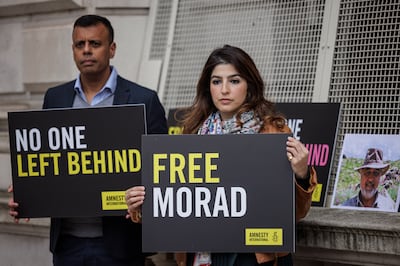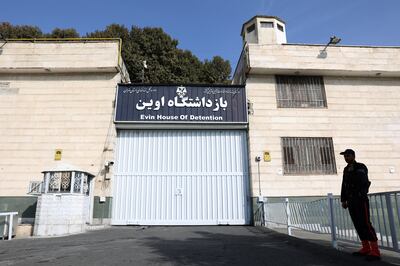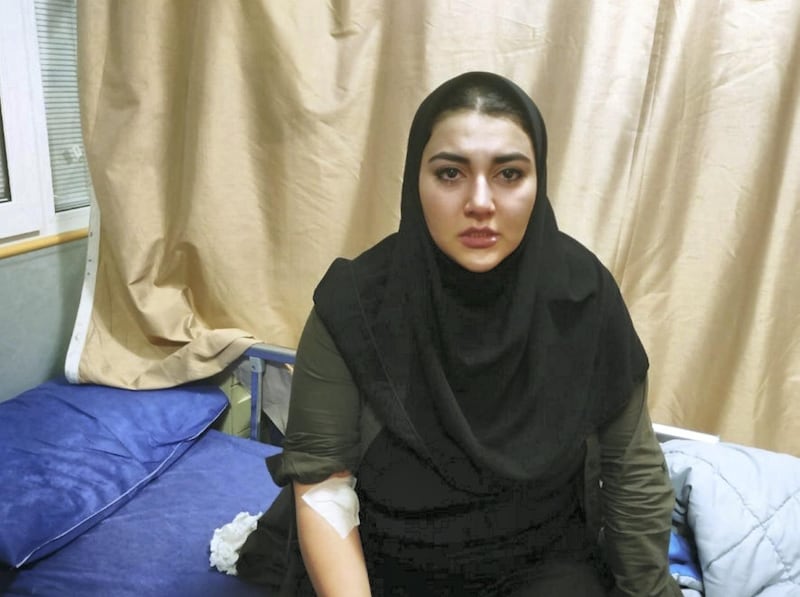A former Iran prisoner has condemned the deal in which American and British citizens were released, stating that Tehran was “laughing in our faces”.
Ana Diamond, who was detained for four years in Iran and sentenced to death on trumped-up charges, told The National she was “infuriated” by the alleged $6 billion payment, arguing that the Tehran regime’s policy of "unjustly detaining" dual citizens had become a “lucrative business model” for the Islamic Revolutionary Guards Corps.
Her assessment was made after the release of four prisoners on Friday that included Morad Tahbaz, a businessman with British, American and Iranian passports, alongside three other men and a woman.
Reports from Washington suggested the deal involved South Korea agreeing to release $6 billion of Iranian funds held in oil receipts.
While the prisoners remain under house arrest in Iran, it appears they will be allowed to leave only once the money is paid.
“I used to be elated for the release of fellow hostages but now I only feel infuriated,” said Ms Diamond, who served a stint at the grim Evin prison.
“These people should have never had their lives tied to a price tag and our governments should have by now found a way to put an end to it. The Iranian Revolutionary Guards are laughing in our faces.”
She said Iran's "hostage diplomacy...really all boils down to profit” and the past decade had seen it “transform into a lucrative business model”.
Ms Diamond, a graduate researcher at the University of Oxford, was arrested aged 19 in 2014 after prosecutors – including Iran’s current president – accused her of spying for MI6, the CIA and Mossad.
She had argued that her arrest, interrogation and trial were all a bargaining mechanism, part of Iran’s approach to hostage diplomacy, to exert leverage on the British government to pay the £400 million ($505 million) it owed Tehran for a 1970s tank deal.
That money was finally paid for the release of Nazanin Zaghari-Radcliffe last year in a similar deal to the one struck last week.

While Ms Diamond admitted it was “always so good to see an unjustly detained person released”, this played into Iran’s method of forcing foreign audiences to put pressure on their governments to give in to their demands.
“It is no longer about diplomacy but about profiting from the democratic and conscientious mechanisms of our governments that are ready to negotiate, even with a serial hostage-taking state, to get their citizens back.”
Former captive Kylie Moore-Gilbert also warned the release would provide an incentive for Iran to take more hostages.
Dr Moore-Gilbert, an Australian-British academic, was held in Evin prison on trumped-up espionage charges and sentenced to 10 years.
“In my view, the transfer of Iran's frozen assets in South Korea does amount to the payment of ransom,” she told The National.
Ms Diamond said she supported the campaign to release Mr Tahbaz and another hostage Emad Shargi.

“I have witnessed how their daughters have gone on national and international television to beg for the safe release of their fathers,” she said.
“But I am entitled to feel angry and ask 'why is this still allowed to happen? How many more families will have to endure such pain and disappointment?'

“Some of these individuals – Siamak Namazi, for example – has spent over half a decade in Evin prison. I am not going to call it a success story when he spent so many thousands of days tortured and degraded, away from his family and his freedom. He should have never been put in that position in the first place – none of them should.”
Ms Diamond is now part of a British parliamentary investigation into state hostage-taking by Iran and has given evidence before the Foreign Affairs Committee.
The White House has said Iran will only be able to use the $6 billion for “humanitarian purposes”, such as food and medicine.







